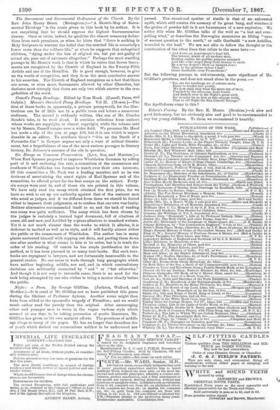Night: a Poem. By George Giillillan. (Jackson, Walford, and Hodder.)—It
is cruel of Mr. Gilfillan not to have published this poem during the lifetime of Professor Aytoun. Another scene might then have been added to the spasmodic tragedy of Firmilian ; and we would much rather read the parody than the original. After encouraging -other and younger men to write in the vague verbose style which seemed at one time to be taking possession of poetic literature, Mr. Clilfillan has given us his own maturer efforts. The prosiness of middle age clings to many of his pages. Ho has no longer that dauntless fire .of youth which dashed out coruscations neither to be understood nor parsed. The occasional sputter of simile is that of an exhausted squib, which still retains the memory of its great bang, and wonders if the grains of powder loft in it are forerunners of a new explosion. We notice this when Mr. Gilfillan talks of the wolf a& "a lost and ever- yelling wind," or describes the Norwegian mountains as lifting "eyes of earnest question to the north," or calls Garibaldi "a new Achilles, wounded in the heel." We are not able to follow the thought or the construction of the other lines that relate to the same hero
And down on Aspromonte's fatal hill, The bravest, truest of all modern men, Sinking supine, his godlike purpose snapped.
And like some angel flung from heaven to earth Bye mean despot's blow—a bastard Jove ! Thee, in thy glorious defeat I hail! Great Garibaldi—true Prometheus:"
But the following passage is, unfortunately, mere significant of Mr. Gilfillan's prosiness, and does not stand alone in the poem :—
" Yet, ere the teachings we of science stern Essay to render into poetry, We now shall sing what the mere eye of man, Unaided by the telescope, bath found, And findeth ever in the Night's great arch. But wonder let us first at this strange truth, That to old Night the Sun himself belongs!"
Has Apollodorus come to this ?


































 Previous page
Previous page